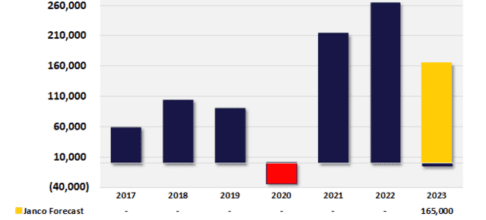U.S. stocks fell on Friday while Treasury yields climbed after Labor Department data showed the U.S. economy created more than 300,000 jobs last month, stoking fears that the Federal Reserve could be even more aggressive in fighting inflation.
What’s happening
- The Dow Jones Industrial Average DJIA fell 213 points, or 0.6%, to 32,913.
- The S&P 500 SPX declined by 32 points, or 0.7%, to 4,226.
- The Nasdaq Composite COMP shed 102 points, or 0.8%, to 13,118.
Major indexes are on track for weekly losses, slumping to begin October as bond yields continue to march higher.
What’s driving markets
A blowout September jobs report sent shock waves across markets on Friday and set U.S. stocks up to record its fifth straight weekly loss for the S&P 500, the longest stretch since May 2022, according to FactSet data. The index was off 1.5% on the week in recent trade.
Data showed the U.S. economy created 336,000 new jobs in September, according to data from the Labor Department, far surpassing economists’ expectations for 170,000 new jobs. Numbers of August and July were also revised higher.
But other details from the report were slightly more favorable for monetary policy. For example, average hourly wages rose a mild 0.2% in September, bringing the 12-month rate of change through September to 4.2%, a slower pace than the prior month’s 4.3% and the smallest year-over-year gain since June 2021.
“Like most reports, Fed will find things to like and dislike here,” said Andrew Patterson, Vanguard senior economist, in emailed commentary.
See: Jobs report shows big 336,000 gain in hiring in September. Labor market is still hot.
The Fed has said it expects the U.S. labor market will need to weaken to help bring the inflation rate down to the central bank’s target of 2%, which is why the data boosted investors’ expectations for one more interest-rate hike from the Fed this year.
Expectations for a hike at the Fed’s upcoming policy meeting, which concludes Nov. 1, rose to nearly 34% from roughly 20.1% a day ago, according to the CME’s FedWatch tool.
Treasury yields also rose on the report, with the 10-year Treasury note BX:TMUBMUSD10Y yield up nearly 13.3 basis points at 4.839% to its highest level since Aug. 8, 2007. The yield on the 2-year note BX:TMUBMUSD02Y, meanwhile, rose 5 basis points to 5.066%. Bond yields move inversely to prices.
Rising yields put more pressure on utilities stocks, which have been the worst-performing sector of the S&P 500 over the past month as rising long-term yields make the high-yielding defensive plays seem less appealing to investors. The S&P 500 utilities sector index XX:SP500.55 was off 3% in recent trade at 278.
“Good news about the economy means corporate America is going to have to deal with higher interest rates for the rest of this year and probably most of 2024. Interest rate sensitive stocks and small companies are not going to do well with this current macro backdrop,” said Edward Moya, senior market analyst at Oanda.
The September nonfarm payrolls report represents the culmination of a week that saw the stock market buffeted by labor-market data. Earlier this week stocks slumped following a surprise rise in job openings, before rising on a report of slowing private sector payrolls from ADP, then easing once more after another low reading on weekly jobless benefit claims.
President Joe Biden is expected to deliver remarks about the jobs numbers at 11:30 a.m. Eastern Time.
Companies in focus
- Pioneer Natural Resources PXD,
+9.98% shares soared following a report in The Wall Street Journal that Exxon Mobil is closing in on a deal to buy the Texan shale driller for about $60 billion. Exxon Mobil XOM,-2.81% shares declined on the news. - Coca-Cola Co. IS,
-0.80% and PepsiCo Inc. PEP,-2.05% slumped after Walmart Inc.’s U.S. chief executive said the new class of weight-loss drugs like Ozempic and Wegovy were causing customers to buy fewer groceries and cut back on those that are high in calories. - Levi Strauss & Co. LEVI dropped after the retailer late Thursday cut its outlook for the full year and its executives noted a “continued softness in the wholesale channel, primarily in the U.S.”
- Tesla TSLA,
-1.97% fell after the automobile maker cut the price of its Model 3 cars from $40,240 to $38,990 and dropped the cost of its model Y electric vehicles from $50,990 to $45,990 in the U.S. - Philips Ph.G.,
-9.16% shares dropped after the U.S. Food and Drug Administration called for more testing of its recalled sleep and respiratory devices, following concerns about foam used in millions of recalled products.













